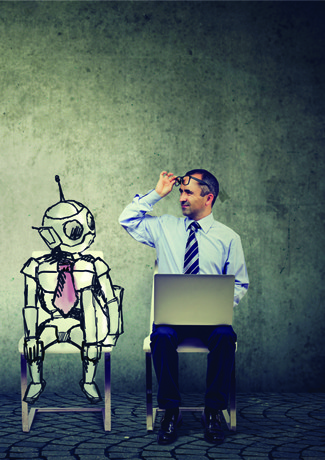
Digitalisation and common sense do not go together
Bits and bites eat GMV (Gesunder Menschenverstand)
Published in: DiALOG - THE MAGAZINE FOR DIGITAL CHANGE | 2021
Watch out for satire. When DiALOG magazine was launched 10 years ago, everything was still fine - almost. Back then, digitalisation was seen as the gravedigger of the real world, as the headline of a Stern article in January 2011 (02.01.2011) suggested: Ten things that will (almost) die out in 2011. These included postcards, paper photos, alarm clocks and friends made of flesh and blood. All still there. But there is one thing that digitalisation has almost completely killed off: common sense - GMV.
There was very little of this before the digital revolution, of which we are only beginning to realise something in Germany. Before the digital revolution, television was to blame for the fact that most people could hardly think straight, according to the old-fashioned. You don't even have to think about the great nonsense of humanity, such as wars, famines, environmental pollution or racism. According to studies and the Süddeutsche Zeitung (14 February 2012), 2011 saw the most wars since 1945 with 20 conflicts. Does this have anything to do with digitalisation?

Bits and bites eat GMV
Digitalisation is also having an increasingly dramatic effect on our brains, our behaviour and our decisions in our everyday lives. Overall, the galloping stultification has increased. At least through digitalisation, which plays a role for the common people. Most people understand digitalisation to mean the internet, social media, gaming apps and a mobile phone. Nothing else! Although - since Corona has dominated our lives, Zoom is also part of it for many. That's it. Virtually no one is aware of the achievements of digitalisation in industry and business. And if they do, many people are against it - motto: "Robots are taking our jobs".
It starts at the top - as always, GMV
The Federal Government, and indeed the entire Bundestag, have about as much insight into digitalisation as the average teaching staff at a German grammar school. The average age of the members of the Bundestag is just under 50, similar to that of the teaching staff. That's actually encouraging. However, there is no GMV by nature and digitalisation is a mystery even to the Chancellor: "The internet is new territory for all of us." Merkel in 2013 - the internet had been a reality for more than fifteen years back then. Of course, everything is different now. Digital teaching and digital studies are also producing top performance on the assembly line during the crisis because of our excellent infrastructure. All right, I'm 63, I was once a teacher myself and I'll take it easy with my age. I promise. Digitalisation is also having an increasingly dramatic effect on our brains, our behaviour and our decisions in normal life, the humdrum of everyday life.
Digital chatting somehow doesn't work
Digitalisation has to do with technology and communication. The latter has not really improved as a result of cat videos, pictures of lunch, 140 - now 280-character language and child-free behaviour online. But technology has - and at a rapid pace. It takes me 20 to 30 minutes to write a handwritten letter, or three quarters of an hour if I want it to be short and sweet. I dictate a WhatsApp or email in one to two minutes, sometimes in 30 seconds. Good, we save time. But we understand each other less and less.
Digitisation in Germany? Since when?
In Estonia, almost the entire administration is digital. Every student has a laptop - they already had one before corona. I recently had to apply for a new ID card. The administrative assistant proudly announced that I only needed to bring a photo. In response to my rhetorical question as to whether this could also be done digitally... you know. Apart from the fact that the average civil servant and administrative employee breaks out in a cold sweat at the term "digital signature", little else in the country works. Not even when crises break out. The German government's coronavirus app is legendary. Also good: vaccination management, digital-free. "All lines busy. Please call back later." And we're not talking about poor infrastructure for industry and business. In Upper Franconia, for example, it takes an architect half a day to send a not really huge plan to a customer - if there aren't x cancellations. They say "The land of poets and thinkers", it's not "The land of solvers and doers". So please!
Digitalisation with GMV!
For me as a coach and consultant, digitalisation is a dream - really. Online coaching, online seminars, online marketing - also via social media. Everything goes digital - in principle. This is actually saving Zirbik Business Coaching's butt economically in Corona times in a completely analogue way. From a GMV perspective, digitalisation is great for business. It's just stupid when the power goes out or the line is no good.
The solution: Denmark or Sweden
Switch on GMV: If you want to build your business digitally, go to Denmark or Sweden: first and second place in digitisation. Germany has made it to 16th place - behind Poland, Romania and the Czech Republic, among others (source: springerprofessional.de) Estonia is also doing better than Germany. The Baltic state is a pioneer in e-government. ID cards and driving licences are digital there. I will soon be receiving mail - yes, in paper - and will be called when my new ID card is ready. Then I'll drive to the authorities and pick it up. Oh yes. Then we'll have a chat, maybe some coffee and cake. We'll probably talk about data protection.www.springerprofessional.de/internet/wirtschaftspolitik/welche-laender-bei-der-digitalisierung-spitze-sind/18249950, 20.08.2020

www. zirbik-business-coaching.de